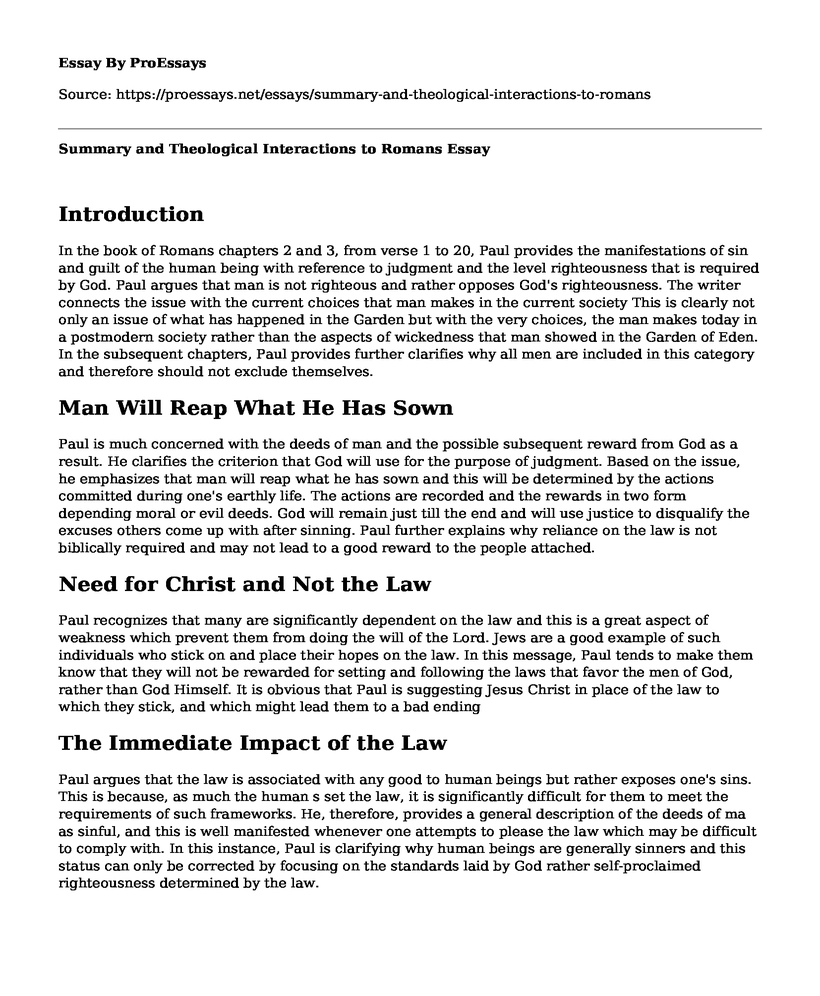Introduction
In the book of Romans chapters 2 and 3, from verse 1 to 20, Paul provides the manifestations of sin and guilt of the human being with reference to judgment and the level righteousness that is required by God. Paul argues that man is not righteous and rather opposes God's righteousness. The writer connects the issue with the current choices that man makes in the current society This is clearly not only an issue of what has happened in the Garden but with the very choices, the man makes today in a postmodern society rather than the aspects of wickedness that man showed in the Garden of Eden. In the subsequent chapters, Paul provides further clarifies why all men are included in this category and therefore should not exclude themselves.
Man Will Reap What He Has Sown
Paul is much concerned with the deeds of man and the possible subsequent reward from God as a result. He clarifies the criterion that God will use for the purpose of judgment. Based on the issue, he emphasizes that man will reap what he has sown and this will be determined by the actions committed during one's earthly life. The actions are recorded and the rewards in two form depending moral or evil deeds. God will remain just till the end and will use justice to disqualify the excuses others come up with after sinning. Paul further explains why reliance on the law is not biblically required and may not lead to a good reward to the people attached.
Need for Christ and Not the Law
Paul recognizes that many are significantly dependent on the law and this is a great aspect of weakness which prevent them from doing the will of the Lord. Jews are a good example of such individuals who stick on and place their hopes on the law. In this message, Paul tends to make them know that they will not be rewarded for setting and following the laws that favor the men of God, rather than God Himself. It is obvious that Paul is suggesting Jesus Christ in place of the law to which they stick, and which might lead them to a bad ending
The Immediate Impact of the Law
Paul argues that the law is associated with any good to human beings but rather exposes one's sins. This is because, as much the human s set the law, it is significantly difficult for them to meet the requirements of such frameworks. He, therefore, provides a general description of the deeds of ma as sinful, and this is well manifested whenever one attempts to please the law which may be difficult to comply with. In this instance, Paul is clarifying why human beings are generally sinners and this status can only be corrected by focusing on the standards laid by God rather self-proclaimed righteousness determined by the law.
Impacts of Law Compliance on Judgment
Compliance with law remains for the flesh and is closely associated with the knowledge of sin. This part of the message from Paul is against the possession of the law and the dependence on the religious heritage. This provides that the aspect of righteousness that man is after is by their own standards and does not satisfy the kind of righteousness that the Lord requires of human beings.
Cite this page
Summary and Theological Interactions to Romans. (2022, Aug 15). Retrieved from https://proessays.net/essays/summary-and-theological-interactions-to-romans
If you are the original author of this essay and no longer wish to have it published on the ProEssays website, please click below to request its removal:
- Research Paper Example on Role of Women Before Civil War
- Essay Example on Exploring Humanity: Unraveling Past & Present
- Essay Sample on Rise of Roman Empire: Prophecy, Power, and Passion
- Essay Example on 1807-1808 US: Slavery Importation Ban & Slave Trade.
- Essay Example on WWI: Trench Propaganda & CPI's Coercive Tactics
- Essay Sample on Controversial War Powers: US Executive & Legislative Branches
- 78 Years Later: Gentrix Badoux's Story of the Pearl Harbour Attack - Research Paper







